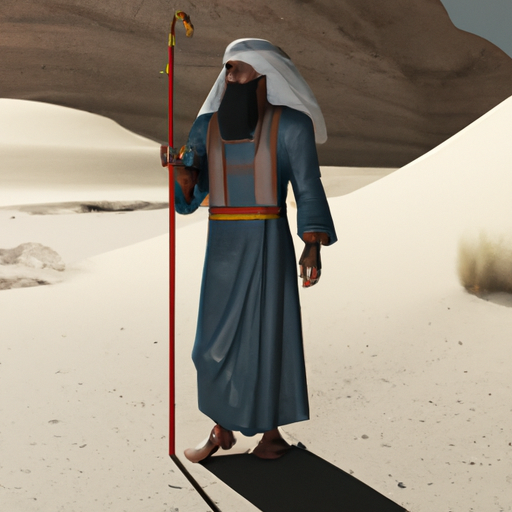
In the ancient land of Egypt, a man named Moses was born into a Hebrew family during a time of great oppression. The Hebrew people were enslaved by the powerful Pharaoh, who feared their growing numbers. Despite the harsh conditions, Moses’ parents raised him with love and faith in God.
As Moses grew older, he became aware of the plight of his people. One day, while he was out exploring, he witnessed an Egyptian taskmaster beating a Hebrew slave. Overwhelmed with anger and a sense of injustice, Moses stepped in to defend his fellow Hebrew and ended up killing the taskmaster in the process.
Realizing the severity of his actions, Moses fled from Egypt and sought refuge in the land of Midian. There, he encountered a group of women struggling to water their flock while being harassed by some shepherds. Moses intervened once again, defending the women and helping them water their animals.
One of the women, named Zipporah, was impressed by Moses’ bravery and kindness. She invited him to her father’s house, where he found solace and a sense of belonging. Moses eventually married Zipporah and started a new life as a shepherd, tending to his father-in-law’s flock.
Years passed, and Moses found himself in the wilderness, leading his sheep to the mountain of Horeb. It was there that he experienced a divine encounter that would change his life forever. As Moses approached a burning bush, he heard a voice calling out to him, saying, “Moses, Moses!”
Trembling with awe, Moses responded, “Here I am.”
The voice revealed itself as the voice of God, the God of his forefathers, Abraham, Isaac, and Jacob. God had seen the suffering of the Hebrew people in Egypt and chose Moses to be the one who would deliver them from bondage.
With trepidation, Moses accepted the divine mission and returned to Egypt, armed with the power of God. He confronted the Pharaoh, demanding the release of the Hebrew people. But Pharaoh’s heart was hardened, and he refused to let the Israelites go.
What followed were ten devastating plagues, sent by God to persuade Pharaoh to free the Hebrew slaves. Each plague was more catastrophic than the last, until finally, Pharaoh relented. The Hebrew people were granted their freedom, and they followed Moses out of Egypt, embarking on a perilous journey through the wilderness towards the Promised Land.
During their journey, Moses faced numerous challenges as he led the Israelites through the desert. He had to mediate conflicts, provide guidance, and ensure their survival. In times of doubt and frustration, Moses sought God’s counsel and received the Ten Commandments, a set of moral laws to guide the people’s behavior.
For forty years, Moses led the Israelites through the wilderness, teaching them the ways of God and helping them grow as a nation. Along the way, he performed miracles, such as parting the Red Sea to allow the people to escape the pursuing Egyptian army.
However, despite his profound faith and leadership, Moses’ journey came with its own trials. At times, the people rebelled and questioned his authority. They grumbled about their hardships and longed for the comforts of Egypt. Yet, Moses persevered, relying on his unwavering trust in God and his love for the Hebrew people.
As the Israelites neared the Promised Land, Moses was informed by God that he would not be able to enter the land himself due to an incident in which he had disobeyed God’s command. Moses accepted this fate with humility and climbed Mount Nebo to gaze upon the land that his people would inherit.
With his mission nearly complete, Moses appointed Joshua as his successor and passed on his wisdom and teachings to the next generation. Shortly after, Moses peacefully passed away, having faithfully served as the man of God and the liberator of his people.
Moses’ legacy lived on in the hearts of the Israelites. His unwavering faith, courage, and devotion to God inspired generations to come. The story of Moses, the man of God, continues to be told to this day as a testament to the power of faith, resilience, and the enduring pursuit of justice.